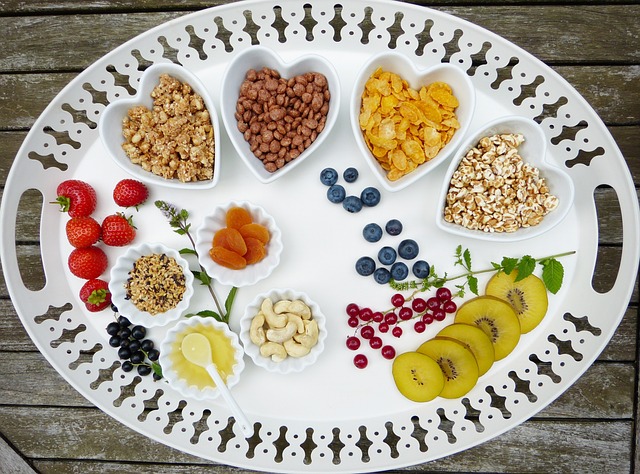In the modern world, the importance of proper nutrition cannot be overstated. The food choices we make have a profound impact on our health, energy, and overall well-being. A nutritious diet plays a pivotal role in maintaining physical fitness, mental health, and reducing the risk of chronic diseases. This comprehensive guide to food and nutrition will help you understand the essential nutrients your body requires, the benefits of a balanced diet, and actionable tips for adopting healthier eating habits.

What Is the Difference Between Food and Nutrition?
While “food” refers to the actual items we eat, “nutrition” is the process by which our body absorbs and utilizes the nutrients from these foods. Good nutrition means providing your body with the right nutrients in the right amounts, which support your body’s growth, energy needs, and ability to fight off illness.
In essence, while food is the substance we consume, nutrition is the science behind how those substances affect our bodies. To maintain a healthy lifestyle, it’s important to understand the role of different nutrients that food provides. These nutrients can be classified into two major categories: macronutrients and micronutrients.
The Importance of a Well-Balanced Diet

A well-balanced diet is crucial for maintaining optimal health. It involves the right proportions of macronutrients and micronutrients, including carbohydrates, proteins, fats, vitamins, minerals, and water. By consuming these nutrients in appropriate amounts, you give your body the fuel it needs for energy, growth, and proper function.
Key Components of a Balanced Diet:
- Carbohydrates: Carbs are the body’s main energy source. They are found in foods like bread, pasta, rice, vegetables, and fruits.
- Proteins: Proteins are essential for tissue repair, immune function, and muscle growth. Common sources include meat, fish, eggs, legumes, and nuts.
- Fats: Healthy fats are necessary for hormone production, cell function, and vitamin absorption. Sources include avocados, olive oil, nuts, and fatty fish.
- Vitamins and Minerals: These are critical for immune function, bone health, and the production of energy. Examples include Vitamin C, Vitamin D, calcium, and iron.
- Water: Hydration is vital for maintaining bodily functions. Water supports digestion, nutrient transport, and temperature regulation.
The Role of Macronutrients
Macronutrients are the nutrients required in large amounts. They provide the energy necessary for the body to function properly.
Carbohydrates: The Body’s Energy Source
Carbohydrates are your body’s primary source of energy. They break down into glucose, which is used to fuel muscles, organs, and the brain. There are two types of carbohydrates:
- Simple Carbohydrates: Found in fruits, dairy, and processed sugars, they provide quick energy but can lead to rapid spikes and drops in blood sugar.
- Complex Carbohydrates: Found in whole grains, vegetables, and legumes, complex carbs offer longer-lasting energy and help maintain stable blood sugar levels.
Incorporating whole grains such as brown rice, oats, and quinoa, along with vegetables like sweet potatoes and beans, can ensure your body receives sustained energy throughout the day.
Proteins: The Building Blocks of the Body

Proteins are made up of amino acids, which the body uses to build and repair tissues, make enzymes and hormones, and support immune function. They are essential for muscle growth, maintaining healthy skin, and supporting various bodily functions.
There are two types of protein:
- Complete Proteins: These contain all nine essential amino acids and are found in animal products like eggs, meat, and fish.
- Incomplete Proteins: These are plant-based proteins like beans, lentils, and grains, which lack one or more essential amino acids.
To ensure you’re getting all the amino acids your body needs, consider combining plant-based protein sources, like beans and rice, or eating a variety of animal-based proteins.
Fats: Vital for Body Function
Fats are a crucial component of a balanced diet, providing long-term energy, supporting cell structure, and aiding in the absorption of fat-soluble vitamins. Fats can be classified into three categories:
- Unsaturated Fats: Found in olive oil, avocados, nuts, and fatty fish, unsaturated fats are heart-healthy and help lower bad cholesterol.
- Saturated Fats: Present in red meat, butter, and full-fat dairy products, these fats should be consumed in moderation to maintain heart health.
- Trans Fats: Often found in processed and fried foods, trans fats are harmful and should be avoided as they raise bad cholesterol levels.
Incorporating healthy fats into your diet by eating foods like salmon, walnuts, and olive oil can have numerous health benefits, including supporting brain health and reducing inflammation.
The Importance of Micronutrients
While macronutrients provide the energy needed for bodily functions, micronutrients such as vitamins and minerals are essential for more specific roles in the body, like immune defense and bone health. Despite being needed in smaller quantities, micronutrients play an indispensable role in your overall health.
Vitamins: Key to Healthy Functioning
Vitamins are organic compounds that support various body functions. For example, Vitamin A is essential for maintaining healthy vision, while Vitamin C strengthens the immune system and acts as an antioxidant.
Some key vitamins include:
- Vitamin A: Found in foods like carrots, sweet potatoes, and spinach, Vitamin A supports healthy vision and immune function.
- Vitamin C: Found in citrus fruits, strawberries, and bell peppers, Vitamin C boosts the immune system and helps protect cells from damage.
- Vitamin D: Obtained from sunlight and foods like fatty fish and fortified milk, Vitamin D helps with calcium absorption for healthy bones.
Minerals: Vital for Health
Minerals are inorganic nutrients that are necessary for various bodily functions, such as building strong bones and teeth, nerve function, and electrolyte balance. Some of the most important minerals include:
- Calcium: Essential for bone health, found in dairy products, leafy greens, and fortified plant-based milks.
- Iron: Needed to carry oxygen in the blood, found in red meat, spinach, and beans.
- Magnesium: Supports muscle and nerve function and is found in foods like nuts, seeds, and whole grains.
A varied diet that includes a range of fruits, vegetables, and whole grains will provide an abundance of essential vitamins and minerals to support your health.
The Importance of Staying Hydrated
Water is often overlooked as a critical nutrient, yet it is vital for proper body function. Water makes up about 60% of your body and is involved in virtually every bodily function, from digestion to temperature regulation.
Proper hydration is crucial for maintaining energy levels, promoting healthy skin, and preventing dehydration. Aim for at least eight cups (about 2 liters) of water per day, but keep in mind that individual needs may vary depending on factors such as activity level, climate, and body size.
Practical Tips for Eating a Healthy Diet
Making healthier food choices doesn’t have to be difficult. Here are some tips to help you maintain a nutritious and well-balanced diet:
- Eat a Wide Range of Foods: Ensure your diet includes a variety of fruits, vegetables, lean proteins, whole grains, and healthy fats.
- Control Portion Sizes: Even healthy foods can lead to weight gain if consumed in large quantities. Be mindful of portion sizes and avoid overeating.
- Limit Processed Foods: Processed foods are often high in added sugars, unhealthy fats, and sodium. Focus on eating whole, unprocessed foods for better nutrition.
- Prepare Meals at Home: Cooking at home allows you to control the ingredients, portion sizes, and preparation methods, making it easier to eat healthily.
- Choose Nutritious Snacks: Opt for healthy snacks like fruits, nuts, yogurt, or whole-grain crackers, instead of sugary or highly processed options.
Nutrition and Mental Health
What you eat doesn’t just impact your physical health; it also plays a significant role in mental health. Research has shown that a nutrient-rich diet can improve mood, reduce anxiety, and enhance cognitive function. Omega-3 fatty acids found in foods like salmon and walnuts have been linked to reduced depression symptoms.
Additionally, a diet rich in antioxidants from fruits and vegetables can help reduce oxidative stress, which has been associated with mental health conditions like anxiety and depression. Eating a diet that supports both body and mind can lead to a healthier, happier life.
Importance of Diet & Nutrition
Diet and nutrition are essential for maintaining optimal health and vitality. A well-balanced diet provides the body with the necessary vitamins, minerals, and nutrients it needs to function at its best. Proper nutrition helps support the immune system, boost energy, and promote healthy growth and development. It can also lower the risk of chronic diseases like heart disease, diabetes, and obesity.
Additionally, a healthy diet plays a key role in mental health, improving mood, focus, and cognitive performance. On the other hand, poor nutrition can lead to health problems, including nutrient deficiencies and increased vulnerability to illness. By prioritizing a nutrient-rich, balanced diet, individuals can strengthen their immune system, enhance overall well-being, and improve both physical and mental performance. Focusing on making healthy food choices is crucial for long-term health and longevity, offering a sustainable approach to a higher quality of life.
Conclusion: The Path to Better Health Through Nutrition
Food and nutrition are foundational to a healthy lifestyle. By consuming a wide variety of nutrient-dense foods, including carbohydrates, proteins, fats, vitamins, and minerals, you are providing your body with the tools it needs to function at its best. A balanced diet not only supports physical health but also contributes to better mental well-being and emotional stability.
Start your journey to a healthier life today by making small, sustainable changes to your diet. Focus on whole, unprocessed foods, stay hydrated, and prioritize variety in your meals. Through mindful nutrition, you can enhance both your physical and mental health for years to come.
Food & Nutrition FAQ
- What are the benefits of a balanced diet?
This question can address the importance of consuming a variety of nutrients for overall health and well-being.
- How can I start eating healthier without feeling deprived?
Offer advice on making gradual, sustainable changes to diet while still enjoying food.
- What are macronutrients, and why are they important?
Explain the roles of protein, carbohydrates, and fats in the body.
- Is it better to follow a plant-based diet?
Discuss the pros and cons of plant-based eating and who it might be most beneficial for.
- What is the role of fiber in digestion and health?
Explain how fiber supports digestive health and its other benefits, such as controlling blood sugar.
- What are some quick and easy meal prep ideas for busy people?
-
Suggest simple, nutritious meal prep options for people with a hectic schedule.
These questions cover a variety of topics related to food and nutrition and can be a great foundation for your blog post!
-

3 comments
[…] Equipment Cardiovascular exercises are vital for improving heart health, burning calories, and enhancing endurance. Cardio equipment is designed to elevate the heart rate […]
[…] Equipment to Comprehensive Guide/2025 Embracing Mindfulness in the Modern World: A Path… The Ultimate Guide to Food and Nutrition: A… Quick and Easy Exercises for Daily Health/25 Everyday Health Fitness: Simple Steps for a […]
[…] example, low-fat yogurt might be marketed as a healthy snack, but many of these products are packed with added sugar to compensate for the loss of flavor. […]